Ten years ago today, I posted my first entry to Restricted Data: The Nuclear Secrecy Blog. It’s trite to remark on how quickly a decade can fly by… but it’s still amazing to experience it. I thought that I would mark the occasion by writing down some thoughts on the history of the blog, some general thoughts on academic blogging, and some thoughts on the future of this blog. I apologize for the length and self-indulgence in this sort of thing. I don’t expect it will be of particular interest to most readers, but perhaps to other academics (especially those just starting) who look at this blog as some kind of “success” will find the story interesting. You can skip to the very end if you want to know about the future.
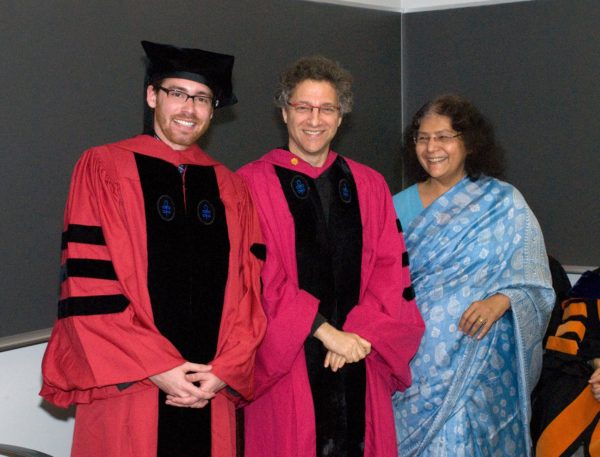
Me, six months before I started the blog, at my Harvard History of Science Commencement ceremony, with my main Harvard advisors, Peter Galison and Sheila Jasanoff. This was when I was trying out having a light beard in order to both fit in better at the Kennedy School, and also to look a little older. These days I do not try to look older, it comes naturally.
When I started this blog in 2011, I was a postdoc at the Center for History of Physics at the American Institute of Physics (AIP). I had gotten my PhD the year before, and had spent another year at Harvard on a postdoc/lecturer gig. So going to AIP, near Washington, DC, was a big change — and a welcome one. I had enjoyed graduate school quite a lot; despite the many anxieties and difficulties associated with both the educational experience and the total collapse of the economy (and the academic job market, esp. in History) a few years before, it was still an overwhelmingly great experience. I met a lot of great people there (many life-long friends), and got to experience the rare joy of learning about new things for their own sake for many years on end. As time goes on I increasingly recognize how rare that sort of environment is in our world.
But AIP came with its challenges as well. I did not have many academic colleagues at AIP; there were a few other historians, and it didn’t have the same kind of rich intellectual atmosphere as Harvard (which is not its fault; it is a different sort of institution and organization). I didn’t know too many people in DC, and it was quite a big up-rooting from the seven years I had spent in Cambridge. It was very exciting to live in DC during the Obama years, and there is an impressive DC-based history of science and technology community, but I had to really work to feel integrated into it. The up-shot of AIP was that they gave me a ridiculous amount of autonomy (thanks Greg Good). I had a lot of ability to spend my time as I saw fit, with the main caveat being that in three years the fellowship would necessarily end and I would be back on the (dismal) academic history job market again. So I had a lot of freedom, and a lot of opportunities, but I did sort of feel like the characters in Cixin Liu’s The Three-Body Problem, with a big timer counting down before my eyes everywhere I looked.
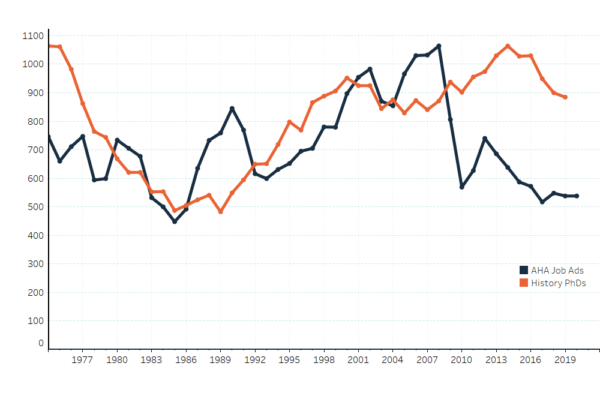
When I say the history job market was bad after 2008, this graph is an evocative indication of what I mean. This is the latest iteration of the so-called “graph of doom” from the American Historical Association, showing the number of new PhDs (orange) compared to the number of advertised academic jobs (blue) in the field of history. Obviously there are jobs for history PhDs outside of the academy not represented by that blue line, but almost everyone who gets a PhD in history dreams of an academic job in it (and those jobs outside of the academy are not as plentiful and easy to get as optimistic recruiters might make them seem). I would also draw your attention to the situation in 2004, when I started my PhD, and 2010, when I finished it — quite a different situation! And note as well that the job market has never really recovered from 2008. There are a lot of reasons for that. In 2004, I remember them telling us about how to play multiple job offers off of one another; in 2010, the advice I was given was literally “find a cave to hide in for a few years.” Source: AHA Jobs Report 2021
I started the AIP job in the late summer of 2011. That November I went to the annual History of Science Society meeting, which is my “main” academic professional society, and my favorite meeting (because I have so many friends who also attend). I was honestly feeling pretty low. I had missed my friends, and I was feeling adrift. The problem with absolute freedom and autonomy is that you have to make your own discipline and structure. That is not really something I was very good at (I’ve gotten better over the years); I did best when I had some kind of base structure of expectations to work within (and diverge from) rather than being told to just figure it out myself. I wasn’t feeling very productive, and I wasn’t sure what I ought to be doing.
I had a really productive conversation at HSS with Karen Darling, then acquisitions editor for history of science at University of Chicago Press. I really wanted to publish my first book with them, on the history of nuclear secrecy (which was the subject of my dissertation). Karen basically told me that I ought to think about what I wanted the book to “do” for me. Did I just need it to get a job, or to serve as my main tenure contribution? Did I want it to be read by people outside of my field? Did I want it to try and change the discourse about the topic? Did I want to become the “go to” person on nuclear history?
These were not questions I had really considered before; I sort of saw the book as a natural thing to do, but wasn’t really thinking about it in functional personal or career terms. It also made me realize that I needed to really think functionally about how I was going to end up with a job at the end of the postdoc. Senior scholars had told me, you need to just finish your book and put out some articles. But academic books and articles are slow — how many could I realistically get “in the pipeline” before I needed that payoff? — and they also could take years to have an “effect” on the academy in a field like history (it is not “fast-paced” like the sciences can be). My goal, as I conceived it, was for the people reviewing my job applications to know my name before they read my application. How could I do that while also working on articles and the book?
I came away from HSS thinking that what I want to do is plant a flag: I wanted to stake out some territory in this field, declare loudly that this was what I was doing and was interested in, and eventually get this book done.1 The dissertation was very long and I figured I would need to cut a lot of interesting things from it, and I thought it would be nice to have a place to put those leavings (it never really ended up working that way, though).
So I decided that starting a blog was the way to go. Even in 2011 that was a little behind the times; people were already talking about blogging as an outmoded activity (the discourse was sort of how people talking about starting a podcast at the moment — oversaturated field, likely audience and success quite small, return on investment of time probably low). But I figured it couldn’t hurt. It would give me an opportunity to practice writing about this subject, it would give me a place to off-load a lot of the interesting things I was finding and talking about (a function that in grad school had been fulfilled by talking to my academic friends about it), and it would perhaps alert others (esp. in the DC area) to the fact that I existed and knew some stuff. I was somewhat inspired by Jeffery Lewis’ blog, Arms Control Wonk, which everyone I knew in the nuke world read, and it appeared to me that he had figured out a way to side-step the standard academic hierarchy of Big Schools with Big Names and Big Journals and Big Resumes to create something that simultaneously elevated his own expertise (by demonstration) as well as played a role in “the discourse.”
It’s perhaps hard to express now, to any regular reader of the blog, how obscure I was in 2011. I was known by some other historians of science, especially those who did nuke things. I had published a well-placed paper on the history of Manhattan Project patenting practices (itself a very anti-climatic experience — this came out in the biggest journal of my field, and I got a total of one e-mail from someone saying, “hey, I saw your paper, and it was really interesting!” That particular someone became one of my first academic friends in DC, as an aside — thanks, Leo!). I had managed to parlay that paper into an appearance on NPR’s Morning Edition, which was super exciting. But the people who knew me were mostly academic historians of science, which is not a huge crowd.
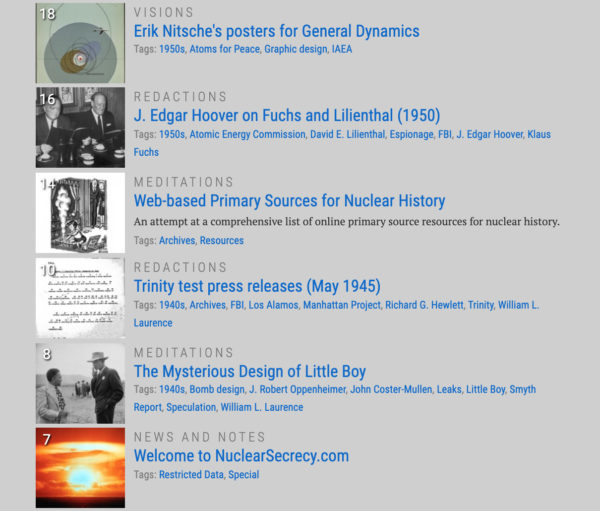
The first two weeks of blog posts as seen in the post archives — three per week! In November 2011 I published 11 blog posts!
The blog by itself did OK at first. Not great. But OK. My early posts ranged in quality; I was really feeling out the genre. I gave myself an insane goal for content-creation: three posts per week. Monday would be some sort of general think-piece (“Musings”), Wednesday would be focused on a document (“Redactions”), and Friday would be something visual (“Visions”). I had a lot of documents and images, so I figured those would go pretty easily, and that I could use the “Musings” to look at larger issues. I had some people who started reading regularly, but it was still fairly niche.
The thing about a schedule like that (three times a week) is that it re-wires your brain. In my academic writing and research I take years to finish a paper. I couldn’t do that on the blog; I needed “content” almost daily. So my brain started looking for content everywhere. Every time I saw something interesting (in my research, at a talk, in the newspaper, on the subway, wherever) my brain would start to click: “that could be the basis of a post.” It was a really radical change in thinking about my subject matter. It was not the one that is encouraged in programs of study for academic history, where long-simmering interest is the name of the game (which I love, as an aside — I really do think you get different results spending years thinking about something, as opposed to days). I had a real burst of creativity as a result, just constantly trying to turn my every odd thought into something “useful.” It would even motivate me to do things I probably wouldn’t have done otherwise. Need content? Go to a talk that looks interesting and write about it! Get off your seat and go to the archives! Go through the documents on your computer one more time and look for something interesting to write about!
Anyway, one of the things that came out of this was NUKEMAP. There are various versions of the story of how and why I made NUKEMAP (all true to one degree or another, but as any historian — or journalist — will tell you, there are different ways to tell a story), but it is worth saying here that the initial impetus was caused by this search for blog content. I did not expect NUKEMAP to become as big as it became. Not in the slightest. I thought it was a cool little thing to do, and I made the first version over a weekend (which should impress upon you how easy it was to make, not that I am some master coder or anything). But then it blew up (the inevitable pun) in a big way, and started driving huge amounts of traffic to my blog. If 10,000 people a day use NUKEMAP (which is what it is like on a “slow” day) and 1% of those people discover my blog for the first time, then that’s 100 potential new blog readers seeing it per day. That’s huge for an academic. As it is, the blog itself could also get thousands of people per day at that point, depending on the topic, and that was just because more eyes had been drawn to it. (Today, the blog gets about 1,000 visits a day despite the fact that I rarely update it. Not huge numbers by Internet standards, but by standard academic standards, that’s massive.)
Gradually it became clear to me that the blog and NUKEMAP were the ticket to the functional success I was looking for. It really was getting my name out there. It also felt like it underscored the accuracy of the theory I had been working with regarding using the Internet to create a different sort of academic success. The number of people who read my “big” article on nuclear patenting seemed pretty small — aside from people working on almost-the-same topic, or some unfortunate graduate students who were forced to read it in a few seminars, I felt like I could count on my fingers the number of people who knew what it said. But NUKEMAP was not only getting famous in newspapers and on places like Reddit, it was feeding back into the academy and even the policy world. I was getting invited to give all sorts of interesting talks; I was becoming known as a “nuclear historian” well outside of my home discipline. Which you might think would induce some kind of impostor syndrome, but long ago (at Harvard) I realized that pretty much everyone was just faking it until they made it, so I had already internalized that it was OK if I was doing that too.2
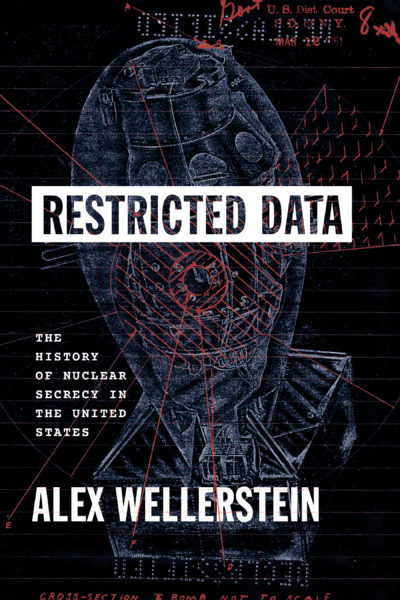
Did I mention my book was now out? Did I? If I didn’t… it’s out! This message brought to you by my publisher, who had to (patiently) wait a decade for this book.
Anyway, the long and short of it is that I got invited to give a talk at a university I had never heard of, the Stevens Institute of Technology, about NUKEMAP (thanks Ed Friedman and Charles Ferguson). While I was there I also became aware that they had a job opening that might be a good fit for me (thanks John Horgan and Lee Vinsel), and I applied for it, and (barely) got it, and so the blog actually did the job I set out for it to do. The book that was in theory one of the motivations for this blog, Restricted Data: The History of Nuclear Secrecy in the United States, was published by the University of Chicago earlier this year. And as of this fall, I have tenure. So it all worked out — in fact, it worked out much better than I would have guessed, if you had asked me in 2011 what I thought the “best-case scenario” would be. I’m still kind of in awe of that, and well-aware that a lot of that was luck (that is, completely beyond my control — even the popularity of the NUKEMAP had more to do with a few UK tabloids deciding to make a much bigger deal of it than was warranted early on than anything I did).
Of course, the irony is that the more successful I became, the less I blogged. Now we’re down to a single blog post every few months. It’s not a coincidence, of course. When I started the blog, I had almost zero responsibilities. Now I have lots. I am a Program Director, meaning that I advise students and attend Curriculum Committee meetings and now that I have tenure I work on the Promotion and Tenure Committee and etc. etc. etc. I also teach and grade and so on. And success creates more work: I have grants for (very cool) projects, but those all take time (not just research time, but also administration, budgeting, applications, etc.). So the hours I have in a day to spend on any research-like work are much constrained from the beginning. (What I don’t have are children — by choice — so my day is still way more free than most academics’.)
On top of that, my options for publishing have increased. If I find a topic that seems like it is really promising, publishing it on my blog is really the least attractive option for it at this point. I’d much rather turn it into a “real publication,” something that could be seen by a wider audience and count much higher on my resume (because despite wanting to get around the traditional academic hierarchy, I am still largely rewarded — tenure, grants, etc. — by things that show up in the traditional resume). So I could have published my latest article on the Tsar Bomba on my blog, but publishing it with the Bulletin of the Atomic Scientists would both give it a wider audience (and it would look a lot better, both visually and editorially, because other eyes would be on it first), but would also give it more credibility than “just a blog post” (as my blog posts are sometime sneered at). I can usually find a higher-profile venue to publish my work these days (this was not the case earlier in my career), so the temptation is always to just do that, now. Of course, I do write blog posts after something comes up elsewhere (and I like having that option), but in the end I spend a lot less time thinking about the blog than I used to when I think about publishing.
Lastly, as my blog audience got larger, I started feeling more pressure to perform. Many of my early posts were very light and easy — here’s a document, look what it says, how neat! Look at this image, it’s amazing, huh! I wouldn’t really feel like that was “cutting it” these days, and so when I do spend time to write a blog post, I feel the need, internally, to spend a lot more time on it. I’m aware-enough to realize that’s kind of a nonsensical trap: there is certainly an audience of people who would be perfectly happy with shorter posts (if you’re reading this one, good on you), and some of my favorite blog posts of yore are pretty short and sweet (I still love this one on Oppenheimer’s eye color; very short, very simple, but there’s a semi-profound historical point buried in it, maybe). But this is why many of the posts that I have made in the last few years have been pretty long and over-wrought. And, of course, if I am feeling like I need to make it “worthwhile,” that easily dovetails into the “other venues” issue — if I am going to spend that much time on something, maybe I want to see if I can get it placed somewhere more prominently?
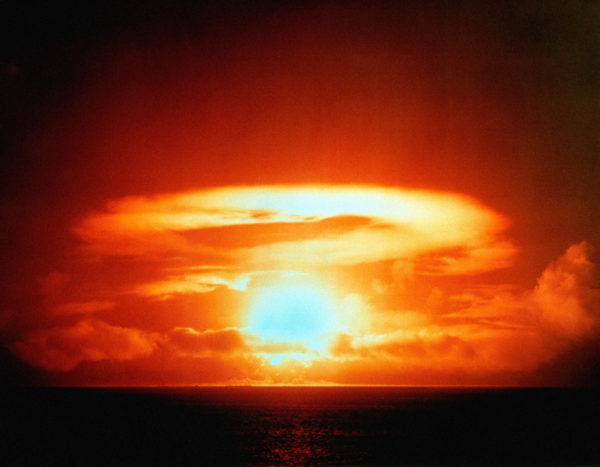
My first blog post on 11/07/2011, began with this image of the Greenhouse Item shot (1951), with its natural question-mark appearance and eerie turquoise glow. I still really love this image as a representation of the nuclear unknown. Here is the version of the file I used in my calendars a long time back, which has been edited to remove dust spots, cropped to make it centered, and upscaled a bit, but is otherwise unedited from the version I scanned at the NARA Still Pictures division over a decade ago.
OK, you’ve read this far, and I want to sketch out a little bit about the future. What lies ahead? Here’s what doesn’t lie ahead, first: I’m not writing this as a “coda” for the blog. I still enjoy writing on it. I sometimes forget how much I enjoy writing on it; it’s a really different tone and idiom than my other writing. I can write directly to you. That still feels intimate and good. I can write a little longer than I ought to and nobody really complains (queue complaining). I can abuse em-dashes and semi-colons and not worry about it too much. I can tackle historical issues that are interesting to me but not quite at the level of “I should write a ‘real’ article about this.” And I feel, with a blog, a little bit more like I’m interacting with a community of people, as opposed to just “broadcasting” at them. So I like that, and I intend to keep that as a thing in my life. I can’t guarantee that I will be able to manufacture time for blogging — my “dance card” is pretty booked for the next couple of years in terms of big projects — but I’d like to transition back to having more short-and-sweet posts if I can. (Knowing me, they will probably not be all that short in the end.) And now, pleasantly, the blog doesn’t have to do the career “work” it did for me in the past. It can just be what it is. And I’m looking forward to that.
So here’s to the next decade of Restricted Data: The Nuclear Secrecy Blog. This is, according to the blog software, the 290th post on the blog (29 blog posts per year is not bad, even if it has dropped off in recent years); I still have, somehow, 134 draft posts. Most of those will never see the light of day for good reasons, but even if I didn’t come up with another new post idea, I’m sure there’s more to be had. Thank you for reading, whether you’ve been there from the beginning, or are just starting with this post. (If you are in the latter category, the post archives are the best way to navigate older topics.) I am unendingly grateful for those of you who have been with me on this journey so far, and feel like I owe what success I have to all of you. Thank you.
- “Planting a flag,” as I call it, was how I made friends in college as an undergraduate as well. UC Berkeley is a huge school and it is hard to know where to start when looking for people to socialize with, especially if you are temperamentally odd (“weird” is the word people have always independently come up with to talk about me and my obsessions), but I found success in joining (and eventually taking over) a large campus club that was devoted to “weird” conversations (it was sort of a philosophy club, but with an emphasis on discussions that included non-philosophers, and I really endeavored to try and make very a ideologically diverse group of people find it interesting and worthwhile). So I was essentially trying to replicate that, in retrospect, online: declare loudly what I think is interesting and then see who flocked to it. [↩]
- I call this “reverse impostor syndrome” — I’m an impostor, but so is everyone else, so it’s OK. [↩]
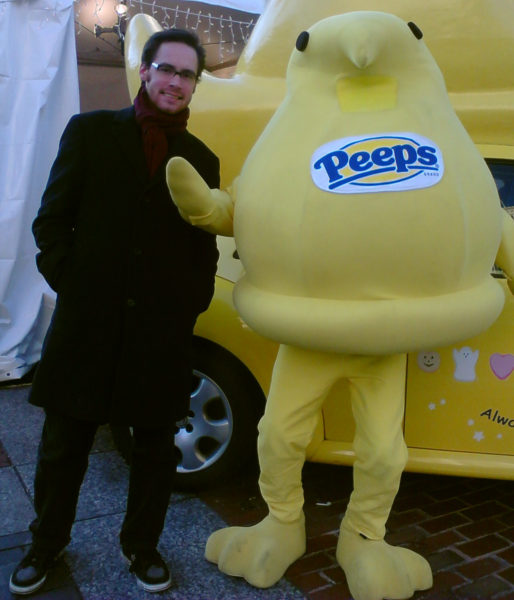
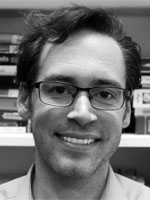
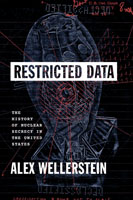
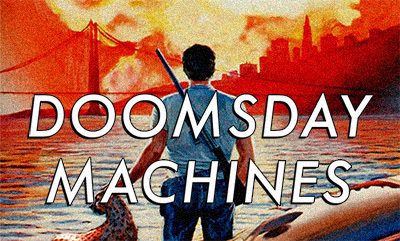
“Today, the blog gets about 1,000 visits a day despite the fact that I rarely update it.”
By the standards of anime bloggers, that’s huge beyond belief! 🙂
But you certainly have become the go-to guy for nuclear stuff, right alongside Carey Sublette… And in this narrow little corner of the intellectual and internet world, you’re also closing in on Chuck Hansen.
Neither is anything to sneeze at. They’re (IMO) significant accomplishments.
Also, congrats on making it ten years as a blogger. An almost impossibly small fraction of bloggers manage that. I’m closing out my fifth year as an anime blogger, and that makes me practically a grand old man.
KEEP THE BLOG GOING. you can’t believe how little there is in lit or history about WWII and post here in New Mexico. The whole damn state was pulled out of the 19th century due to military spending and weird nuke experiments. real decision makers were behind this. keep up your great history. and thank you!!
Thank you for all the great blog posts you published in the last decade. It really got me interested in nuclear history and I have read several books because of your blog. While I don’t participate in any academic discussions related to this stuff(I’m an aerospace engineer who prefers to avoid the defense industry), I greatly enjoy reading about history in a manner that properly represents unknowns and also highlights that decisions in the past were also made by individual people who had complex views on the world.
Happy blogversary, Alex! Thanks so much for everything you’ve written.
I’ve been blogging since 2004, and I appreciate the shifting views of blogs as platforms. Your path is a fascinating one; I myself have gotten attention and occasionally work from mine. (I’m a technical writer by day, with a tiny side career as a music reviewer. It’s the latter where I sometimes get work from blogging.) I definitely appreciate how the blog has helped your career. I follow many folks on musicology twitter and have heard a lot about the academic job market for music historians.
A little research reveals that I started reading Restricted Data in 2014, when a friend blogged about your blog. I have enjoyed every word that I’ve read, and in some cases I’ve also been terrified by what I read. I have referred people to your posts on presidential power and nuclear weapons multiple times, terrifying them as well, particularly during the previous presidential administration.
Thanks again and I look forward to reading future posts and your book.
I read this with interest! what I want to say is, good for you–what a worthy enterprise, and terrific persistence.
I’m no longer working in this field, but I wrote the biography of Alice Stewart, The Woman Who Knew too Much. If you don’t know about her, check the book out. She struggled with the nuclear establishment all her life. Also my article, written after she and Richard Doll died, and I could write honestly about him, Reputation and the Making of Scientific Truth, or some such title, published in Perspectives in Biology and Medicine. It’s quite a story, but then the history of nuclear is one outrageous story after another.
I really enjoyed this post – coincidentally, I also started my PhD in 2004 and finished in 2010. Lucky for me, I took a job in 2008 in the midst of it all (against everyone’s recommendations and advice). I started that job on October 2008 against the backdrop of the economic collapse. Congrats on the new book!
Captain Lavender will always have a place in my heart!
Great to see this post. The decade really has flown by.